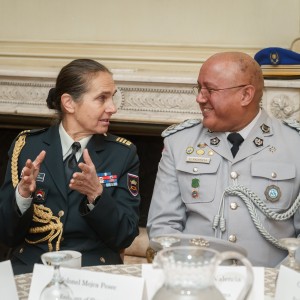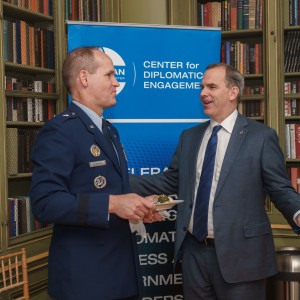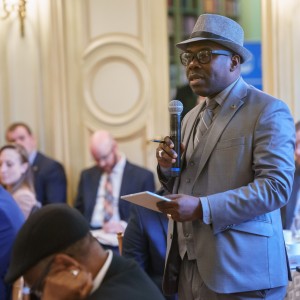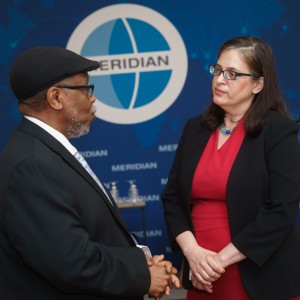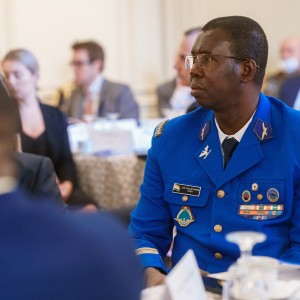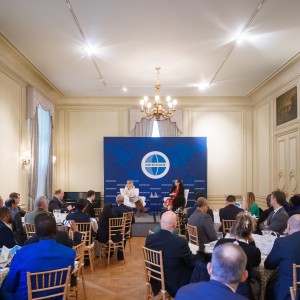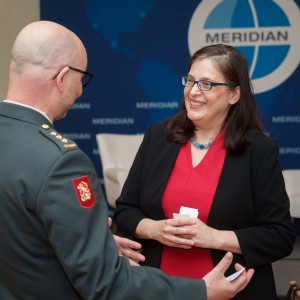Pol-Mil A/S covers Ukraine, Taiwan & alliances in military attaché address
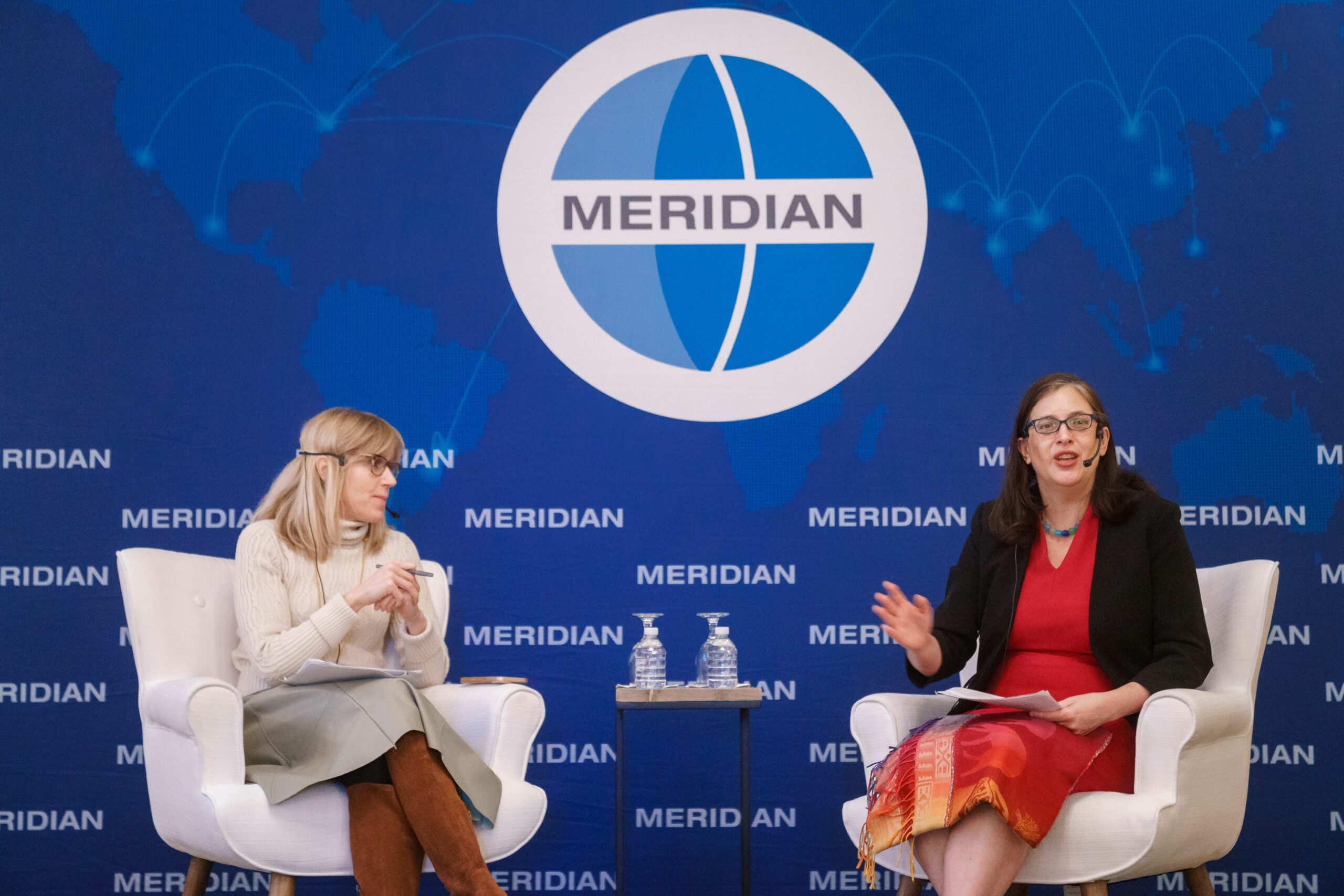
The State Department’s Bureau of Political Military Affairs works with partners and allies of today and forges new relationships for the challenges of tomorrow. On Wednesday, January 25, the Meridian Center for Diplomatic Engagement hosted an Insights@Meridian program featuring The Honorable Jessica Lewis, Assistant Secretary of State for Political-Military Affairs, for a wide-ranging conversation moderated by Missy Ryan of the Washington Post.
Here are some top takeaways from the program:
1. Support for Ukraine is Unwavering
The U.S. has sent over $50 billion in aid to Ukraine in 2022, including $26.7 billion in security assistance to Ukraine since Russia’s further invasion. Just as Assistant Secretary of State for Political-Military Affairs Jessica Lewis was speaking at Meridian, President Biden announced that 31 Abrams tanks will be sent to Ukraine. More than 50 partners and allies, notably the Baltics and Poland, have provided security assistance to Ukraine in response to the full scale invasion. While there as been vast sums of aid sent to Ukraine, President Zelenskyy reshuffled his cabinet after a corruption scandal emerged that raised questions about U.S. aid to Ukraine.
2. Understanding the Channels for U.S. Security Assistance
There are multiple mechanisms to receive security aid from the U.S. Government including through the Department of State and Department of Defense. A/S Lewis noted, “the road to renewing and reimagining our alliances runs through the State Department, and arms sales and defense transfers are integral to these relationships.” The Bureau of Political-Military Affairs acts as a bridge between the two Departments. For example, the Presidential Drawdown Authority allows for the Department of Defense to send defense inventory to foreign countries in emergency situations. It is mandated to the Secretary of State and implemented by the Department of Defense. While the Department of Defense and State are the primary security assistance providers, the U.S. Congress appropriates the funds for the Departments.
3. There are Diverse Ways to Partner with the Bureau of Political-Military Affairs
U.S. foreign assistance ranges includes providing and selling defense hardware, increasing military finance options, demining, and humanitarian assistance, and building capacity for peacekeeping operations. Through this multitude of mechanisms, the Bureau of Political-Military Affairs aims to strengthen alliances, forge new partnerships, and identify new ways of cooperation. Lewis noted that “security assistance is a vital investment in democracy and a hedge against autocracy.” The Bureau of Political-Military Affairs is subject to the “Leahy Laws,” which prohibit the U.S. from sending assistance to foreign security forces that are suspected of gross violations of human rights.
4. Rising to the Challenges of Geopolitics
The security assistance provided by the Bureau of Political-Military Affairs to partners and allies depends on the level and type needed. The Bureau tackles the highest priorities first, including working with the private sector on how to speed up production for military assistance. The Bureau has identified the Indo-Pacific as a key area of competition with the People’s Republic of China. Lewis noted the U.S. must “manage the pacing challenge of the PRC” by “bolstering security sector assistance in the Indo-Pacific.” This assistance includes countering intellectual property theft and maritime illicit activity and providing support for multinational peacekeeping operations. The U.S. has also supported Taiwan with over $37 billion in arms sales since 2010 as China has continually threatened its sovereignty.
5. Don’t Lose Sight of the Bigger Picture
While the world is focused on Ukraine right now, renewed attention to other regions and thematic topics is required. Counterterrorism and food/water security remain challenges around the globe, particularly in Africa and the Middle East. There also remains hesitancy from countries to join UN Peacekeeping Operations over fear of terrorist attacks and open-ended commitments. While the U.S. is rethinking how to build security partnerships, it hopes to provide a more reliable security partnership tailored towards defense for a country’s specific needs. A/S Lewis identified three key areas for the future of security assistance including (1) transitioning off of Russian arms, (2) elevating security sector governance, and (3) revitalizing the defense industrial base.
This program is made possible with support from

Project summary
| Pol-Mil A/S covers Ukraine, Taiwan & alliances in military attaché address | January 2023 | |
|---|---|
| Number of Attendees: | 66 |
| Regions: | Africa, Europe and Eurasia, Near East and North Africa, Western Hemisphere, East Asia and Pacific |
| Countries: | Austria, Barbados, Cameroon, Croatia, Egypt, Greece, Kazakhstan, Liechtenstein, Mexico, Montenegro, Mozambique, Nepal, New Zealand, Nicaragua, Nigeria, North Macedonia, Oman, Pakistan, Poland, Panama, Romania, Singapore, Slovenia, Netherlands, United Kingdom, Ukraine, Zambia, United States, Yemen |
| Impact Areas: | Foreign Policy, Security and Defense |
| Program Areas: | Diplomatic Engagement |
| Partners: | Diplomatic Corps, Private Sector, Public Sector |
